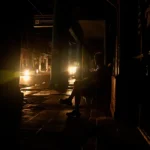
Amid the threat of raids around the country, the acting Secretary of Homeland Security, Benjamine Huffman, announced this Tuesday that raids will be allowed inside and around schools and churches. Joe Biden’s administration had established that ICE – US Immigration and Customs Enforcement, the anti-immigration agents – had restricted its actions in these areas, considered “sensitive.”
Now, the new Trump administration has changed the guidelines.
“Criminals will no longer be able to hide in America’s schools and churches to avoid arrest. The Trump administration will not tie the hands of our brave law enforcement officers, but rather relies on their common sense,” says the statement released by the Department of Homeland Security.
Schools and churches are two fundamental pillars and meeting points within the Latino and migrant community. For many migrants, the church is a meeting place with other migrants and a space from which to build support networks. Some churches also provide help by providing food and clothing to migrants and vulnerable people. Now, the Trump administration has turned one of the few safe spaces for the migrant community into a place to avoid.
“They want to scare people and make them stay home,” explains Abel Núñez, director of Carecen, an organization that works with the Latino and migrant community in Washington DC.
Núñez pointed out, shortly before the announcement was made public, that he was afraid that many migrant families would stop taking their children to school because the exit from educational centers is a place where immigration agents can easily make arrests. . Now, with the announcement of raids even within schools, the situation worsens and the feeling of encirclement towards migrants increases.
Raids across the country
This Tuesday morning, humanitarian organizations that work on the Arizona border told elDiario.es that they had already detected the presence of military personnel on the border with Nogales. El Universal published a video from the Mexican side of the border, in which the authorities had already enabled the installation of the Estrellas Nogales Sports Unit, where Mexicans deported from the US will be received.
The new director of ICE, the Immigration and Customs Enforcement Service, Thomas Homan, had announced that raids against undocumented migrants would begin this Tuesday. The “border czar” has explained that he will deploy ICE troops throughout the country to arrest and deport people without papers. Although it has not been reported where the raids will take place, Chicago was already mentioned last week. The American network NBC also published last week that raids of this type were expected in Washington.
Organizations that support migrants have been distributing posters in the capital for weeks, explaining how to react if ICE shows up at their homes and what their rights are. Julia, a volunteer with Carece, an organization that works to support Latinos in the city, explains that many families have been preparing for days to stay home due to fear of possible arrests on the streets of Washington.
Congress finalizes a key law for deportations
The United States Congress is finalizing a bill to facilitate the deportation of undocumented migrants who have been accused of minor crimes. The text is a salvo from the Republican majority to the recently inaugurated Donald Trump Administration and, if it becomes law, it could be key to carrying out the mass deportations that the new president promised.
The document, named Laken Riley Actit only needs to pass a final vote in the House of Representatives – which could take place this week – for it to end up on the Oval Office table and for Trump to sign it, turning it into law.
The text began to be processed at the beginning of the month with the aim of preparing the ground for when the Republican was sworn into office on January 20.
The law would force the Department of Homeland Security (DHS) to detain undocumented migrants accused of minor crimes, such as petty theft or supermarket robbery. Currently, DHS only detains undocumented migrants who have been charged with serious crimes such as rape, domestic violence, murder, and drug-related crimes.
In the last vote in the Upper House, in addition, the range of crimes was expanded with the amendments of two senators so that the law also includes undocumented migrants who have been accused of attacking a police officer and causing death or serious bodily injury to a person.
“This law can expand the number of people who fall under mandatory detention and can be used to persecute people simply for being immigrants or Latinos. “It poses a very serious threat,” he explains to elDiario.es Setareh Ghandehari, lawyer for Detention Watch Network, an organization that works with detained migrants and against racial detentions.
Ghandehari warns that Laken Riley Act will encourage detentions based on race, focusing especially on the Latino community, and that the rule can be used to expedite deportations. “Currently, there are already local agencies that have adopted anti-immigrant stances and use their detention systems to funnel people into the immigration system and, eventually, deport them.”
An example of these practices – which, according to Ghandehari, already exist – are traffic controls on the roads. “In many parts of the country, immigrants are targeted at roadblocks. They are stopped more, with the excuse that they are speeding or whatever, with the intention of finding out if that person has papers. They are identifications based on racial profiling that with this law will not only be incited, but will even be legitimized,” the lawyer denounces.
The American Civil Liberties Union (ACLU) warned in a letter to senators that even individuals who committed these types of minor crimes years ago could be subject to mandatory detention, “especially under an anti-immigrant administration with the intention of carrying out mass deportations.” , the text noted in reference to the Trump Government.
By establishing mandatory arrest for a minor crime, undocumented immigrants can be placed in a detention center or prison simply for an accusation, without even having been tried or sentenced. The ACLU points out that the law would require incarceration for the migrant, even “when an immigration judge determines that he or she does not pose a threat to the community or is a flight risk.”
Once these people end up in detention centers or prison, it is much easier to begin the deportation process. The framework of this new law, as Ghandehari and the ACLU warn, would greatly facilitate the work of immigration agencies when carrying out the mass deportations that Trump promised.
The approval of the law would be a perfect complement to the mountain of executive orders that the president signed on his first day, declaring a “national emergency” on the southern border and revoking the right to citizenship for having been born on American soil.
The Republican majority in Congress guarantees that the law will be approved in the last round of voting. Although it has also had the support of Democratic congressmen. In the Senate, one of the favorable votes was that of the Democratic senator from Arizona, Rubén Gallego.
During Trump’s previous term, Gallego was one of the Arizona congressmen who sent a joint letter to the president asking him not to grant clemency to Sheriff Joe Arpaio, who was once convicted of carrying out pursuits and racial profiling arrests against the Latino community in Arizona. Now, Gallego has voted in favor of a law that threatens to encourage these types of arrests.
Democrats’ support for this law is also an example of how Trump’s anti-migrant rhetoric has managed to permeate the entire political spectrum. Last October, humanitarian organizations and lawyers working on the border were already preparing for the increase in harsh measures against migrants, whether Kamala Harris or Trump won.
The adoption of tougher positions against immigration also responds to the crisis that the Democratic Party is still facing after its defeat at the polls last November.
Source: www.eldiario.es

